2018-2019学年七年级英语上册Unit6Doyoulikebananas单元知识解读方案课件新版人教新目标版
人教版七年级上册英语讲义 Unit 6 Do you like bananas

Unit 6 Do you like bananas? 讲义一、【重点单词】banana /bə'nɑ:nə/香蕉hamburger /'hæmbɜ:(r)ɡə(r)/汉堡包tomato /tə'mɑ:təʊ/西红柿ice-cream /,aɪs'kri:m/冰激凌salad /'sæləd/沙拉strawberry /'strɔ:berɪ/草莓pear /peə(r)/梨milk /mɪlk/牛奶bread /bred/面包birthday /'bɜ:(r)θdeɪ/生日dinner /'dɪnə(r)/(中午或晚上吃的)正餐week /wi:k/周;星期food /fu:d/食物sure /ʃʊə(r)/当然;肯定;一定burger /'bɜ:(r)ɡə(r)/汉堡包= hamburgervegetable /'veʤtəbəl/蔬菜fruit /fru:t/水果right /raɪt/正确的;适当的apple /'æpl/苹果then /ðen/那么egg /eɡ/蛋;鸡蛋carrot /'kærət/胡萝卜rice /raɪs/大米;米饭chicken /'ʧɪkɪn/ji鸡肉so /səʊ/ (引出评论或问题)那么breakfast /'brekfəst/早餐;早饭lunch /lʌnʧ/午餐star /stɑ:(r)/明星;星星eat /i:t/吃well /wel/好;令人满意的habit /'hæbɪt/习惯healthy /'helθi/健康的really /'ri:əli/真正地question /'kwesʧən/问题want /wɒnt/需要;想要be /bi:/变成fat /fæt/肥的;肥胖的二、【重点短语】1. John ’s birthday dinner 约翰的生日宴会2. vegetable salad 蔬菜沙拉3. two tomatoes 两个西红柿4. eat well 吃得营养5. think about 考虑6. eat/have breakfast/lunch/dinner 吃早/午/晚饭7. sports stars 体育明星8. the volleyball star 排球明星9. ask sb. about sth. 问某人某事10. like hamburgers/ice-cream 喜欢汉堡包/冰淇淋11. like eating eggs 喜欢吃鸡蛋12. her eating habits 她的饮食习惯13. be (not) healthy (不)健康14. one last question 最后一个问题15. healthy food 健康食物16. after breakfast/lunch/dinner 早/午/晚饭后17.one last question 最后一个问题18.some fruit 一些水果19.for dinner 作为晚餐20.how about 怎么样三、【重点句型】1.—Do you like salad? 你喜欢沙拉吗?一Yes,I do. /No, I don’t. 是的,我喜欢。
七年级英语上册 Unit 6 Do you like bananas?Section A(1a2d)

?
答案: ①have/eat dinner ②have/eat breakfast
第二十一页,共24页。
Ⅰ. 用所给词的适当形式(xíngshì)填空
1. —
you
(like) hamburgers?
—Yes, I do. I like them very much.
2. Let’s
(go) to school with Li Lin and Wang Mei.
5. tomatoes
第二十二页,共24页。
Ⅱ. 单项选择(xuǎnzé)
1. Look! Some bread
in the bag and some apples
on
the table.
A. is; is
B. is; are
C. are; is
D. are; are
2. These are
burgers.
第十五页,共24页。
【自主归纳】以-o结尾加-es的可数名词 以-o结尾加-es的可数名词主要(zhǔyào)有以下几个:
Negro→Negroes黑人 hero→heroes英雄 potato→potatoes土豆 tomato→tomatoes西红柿
可用一句顺口溜记住: 黑人英雄爱吃土豆和西红柿。
*We have English at eight on Monday. 我们在周一八点上英语课。 *They will have a meeting tomorrow. 他们明天要开会。
第二十页,共24页。
【学以致用】
①让我们(wǒ men)吃晚饭吧。
Let’s
.
②你们什么时候吃早饭?
What time do you
初中英语《Unit6Doyoulikebananas》单元教学设计以及思维导图

Unit 6 Do you like bananas适用年级人教版新目标七年级上册所需时间课内共用4课时;课外共用1课时。
主题单元学习概述本单元教材取决于《义务教育英语课程标准》功能意念项目表第2项态度(attitude)中的第24条喜欢与不喜欢(likes and dislikes)。
这是学生初次接触这一话题,它与学生的生活息息相关,所以学生学起来比较容易接受,比较易于应用。
本单元的中心话题是Food.主要语言功能项目是Talk about likes and dislikes。
教材以紧扣话题的5个听力练习(1b,2a,2b SectionA;1c,1d Section B)2个对话(2d Section A; 2b Section B)为载体,在具体的语言环境中呈现了行为动词like的一般现在时的肯定句、否定句、一般疑问句的构成以及简单的回答。
本单元包括一些食物的词汇,通过学习这些词汇,学生学会区分可数名词与不可数名词;另外,通过谈论自己及他人一日三餐的喜欢吃的食物,学生将了解健康食品,并且根据喜好进行合理的营养配餐。
同时,教材还在74页安排了语音训练,包括元音字母Aa,字母组合ai, ay, al, aw 的发音规则,名词复数的读音及单词的重音。
本单元的学习重、难点:(1)语言知识方面:立足语言实践活动,在完成任务的过程中掌握谈论喜好和厌恶以及表述一日三餐的词汇;掌握Grammar Focus 中出现的以及What about…? Let’s…等语言结构。
(2)语言技能方面:1)开展多种任务型的听力活动,使学生获得理解、识别和处理与谈论喜好、厌恶相关的信息。
2)展开各种任务活动,使学生具备较熟练地运用所学语言谈论喜好与厌恶,描述一日三餐的合理搭配的能力。
3)引导同步阅读,使学生理解与主题相关的语言材料,并增强学生运用语言获取更多信息的能力。
4)进行写作练习,使学生具备初步的综合运用语言的能力。
七年级英语上册Unit6Doyoulikebananas

My father likes __b__lu, ebut he doesn’t like ___.red
My mother likes _b_l_a_ck_, but she doesn’t like _y_e_ll_o_w__.
第二十六页,共三十六页。
1. What food / sports / colors do you like and dislike?
Do you like … for lunch?
Do you like … for dinner?
No, I don’t. I like oranges.
Yes, … /
No, …
Yes, … /
No, …
第十二页,共三十六页。
Fill in the chart.
Breakfast
Lunch
Dinner
_I_d_o_n_’_t_li_k_e_t_o_m__a_to_e_s_. And for dinner, __I_l_ik_e _ch__ic_k_e_n__a_n_d__r_ic_e_,_b__u_t_I_d_o__n_’t__li_k_e_a__p_p_le. sFor
breakfast, __M__ik_e_ likes ___e_g_g_s_a_n_d__m_i_l_k_, _b_u_t _h_e__d_o_e_s_n_’_t__h_e_likes _h_a_m__b_u_r_g_e_r_s_a_n_d__s_a_l_a_d_,_b_u_t__h_e_d_o_e_s_n_’_t_l_ik_e
第九页,共三十六页。
What do you have for your supper every day?
第十页,共三十六页。
人教版七年级上册英语Unit6Doyoulikebananas
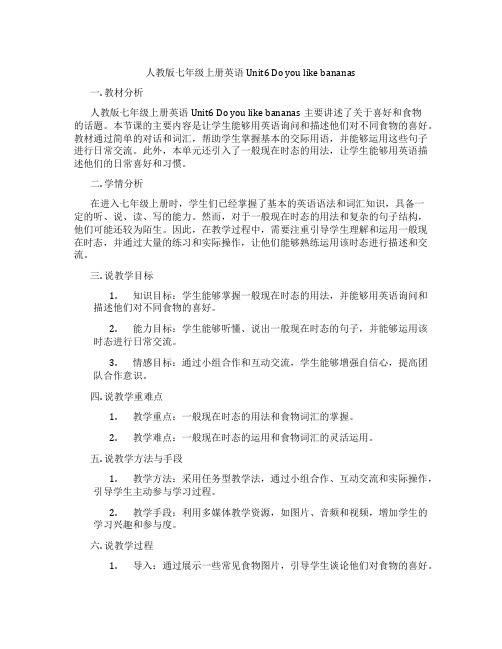
人教版七年级上册英语Unit6 Do you like bananas一. 教材分析人教版七年级上册英语Unit6 Do you like bananas主要讲述了关于喜好和食物的话题。
本节课的主要内容是让学生能够用英语询问和描述他们对不同食物的喜好。
教材通过简单的对话和词汇,帮助学生掌握基本的交际用语,并能够运用这些句子进行日常交流。
此外,本单元还引入了一般现在时态的用法,让学生能够用英语描述他们的日常喜好和习惯。
二. 学情分析在进入七年级上册时,学生们已经掌握了基本的英语语法和词汇知识,具备一定的听、说、读、写的能力。
然而,对于一般现在时态的用法和复杂的句子结构,他们可能还较为陌生。
因此,在教学过程中,需要注重引导学生理解和运用一般现在时态,并通过大量的练习和实际操作,让他们能够熟练运用该时态进行描述和交流。
三. 说教学目标1.知识目标:学生能够掌握一般现在时态的用法,并能够用英语询问和描述他们对不同食物的喜好。
2.能力目标:学生能够听懂、说出一般现在时态的句子,并能够运用该时态进行日常交流。
3.情感目标:通过小组合作和互动交流,学生能够增强自信心,提高团队合作意识。
四. 说教学重难点1.教学重点:一般现在时态的用法和食物词汇的掌握。
2.教学难点:一般现在时态的运用和食物词汇的灵活运用。
五. 说教学方法与手段1.教学方法:采用任务型教学法,通过小组合作、互动交流和实际操作,引导学生主动参与学习过程。
2.教学手段:利用多媒体教学资源,如图片、音频和视频,增加学生的学习兴趣和参与度。
六. 说教学过程1.导入:通过展示一些常见食物图片,引导学生谈论他们对食物的喜好。
2.新课呈现:引入一般现在时态的概念,并通过示例句子让学生理解一般现在时态的用法。
3.对话练习:让学生听录音或观看视频,模仿对话中的句子,并进行角色扮演。
4.小组活动:学生分组进行讨论,用英语询问和描述他们对食物的喜好。
5.巩固练习:通过完成练习题和互动游戏,让学生进一步巩固一般现在时态的用法。
2018年七年级英语上册 Unit 6 Do you like bananas Section B

Unit 6 Do you like bananas?Section B &Self-check1.breakfast/’brekfəst/ n.早餐,三餐饭前不加冠词。
eg:have breakfast吃早饭have lunch 吃午饭have supper吃晚饭但在三餐之前有修饰词时,可以加冠词。
We have a big lunch.我们吃了一顿丰盛的午餐。
He has his breakfast quickly.他快速吃完早饭。
2.lunch/lʌntʃ/ n.午餐What do you like to have for lunch?你午餐喜欢吃什么?拓展:for lunch午餐,at lunch在午餐时,have lunch吃午餐,before lunch午餐前,after lunch午餐后。
3.Sports StarEats Well!运动明星吃得好!(1)eat/i:t/ v.吃She only eats some bread for breakfast.她早餐只是吃了一些面包。
What does Gina like to eat? 吉娜喜欢吃什么?辨析:have,eat与drink动词have表示“吃、喝”,在英国多用have代替drink,在美国常用eat代替have,而与三餐词汇连用时多用have。
eat流行于美国,多指“吃”,表示“喝”时通常用于喝汤类食物。
drink习惯上用于“喝”水、茶、奶、咖啡等饮料,没有“吃”的含义。
eg: What do you have for lunch? 你午餐吃了什么?Does she like to eat hamburgers? 她喜欢汉堡包吗?Let’s drink some coffee.让我们喝一些咖啡吧。
(2)well/wel/ adv.好,令人满意地eg:Lu cy sings well.露西唱歌唱得好。
拓展:well adj.意为“身体好的;健康的”。
2018-2019学年七年级英语上册 Unit 6 Do you like bananas Sect

Unit 6 Do you like bananasSection A (3a—3c)Ⅰ.词汇(A)写出下列名词的复数形式。
1.banana __________ 2.tomato __________3.photo __________ 4.orange __________5.strawberry __________(B)写出下列动词的第三人称单数形式。
1.have__________ 2.watch __________3.play __________ 4.eat __________5.like __________Ⅱ.根据句意及汉语提示完成句子1.I don't like ________ (鸡蛋). What about you?2.I have ________ (鸡肉) for dinner.3.Eddie doesn't like ________ (胡萝卜).4.—Do you like________ (米饭)?—Yes, I do.5.She likes fruit. ________ (那么), let's eat some apples. Ⅲ.用括号内所给单词的适当形式填空1.We often have some ________ (carrot) and milk.2.She likes vegetables, but she ________ (not like) salad. 3.Tom and I like ________(tomato).How about you?4.My grandpa ________(have) some milk every day.5.These ________ (orange) cups look nice.6.________ (do) they like pears?7.Does he like ________ (strawberry)?8.Lily has some ________ (bread) every morning.Ⅳ.单项填空( )1.He likes hamburgers, but he________eggs.A.don't like B.likesC.doesn't like D.isn't like( )2.I often eat some vegetables, like(像)________.A.strawberries B.eggsC.tomatoes D.hamburgers( )3.—Let's________ icecream.—I don't like ________.A.have; it B.to have; itC.to eat; it D.eat; they( )4.Mike likes ________ and I like ________.A.breads; chickens B.salad; chickenC.breads; chicken D.salad; chickens( )5.I don't like vegetables, ________ I like fruit. A.and B.soC.but D.forⅤ.根据汉语意思完成句子,每空一词1.迈克喜欢水果,他不喜欢汉堡包。
人教版英语七年级上册 Unit 6 Do you like bananas

This is a fruit and vegetable house (果疏屋). What’s in the house? (果蔬屋里有什么?)
some vegetables
some fruits
banana bananas
pear pears
strawberry strawberries
2 A: Do you like salad? B: No, I don’t.
1 A: Do you like bananas? B: Yes, I do.
3 A: Do you like oranges? B: Yes, I do.
Post-listening
1c Practice the conversations with your partner. Then make your own conversations.
2. tomatoes __i _ 3. oranges _f__ 4. ice-cream _h__ 5. salad __b_ 6. bananas _g__
7. strawberries __c_ 8. pears __j_
9. milk __e_ 10. bread _a__
Read the dialogue in the picture.
Read the conversation after the tape.
1. Girl: I like hamburgers. Do you like hamburgers? Boy: Yes, I do.
2. Girl: Do you like tomatoes? Boy: No, I don't like tomatoes.
—Do you like bananas? —Yes, I do. —Do you like salad? —No, I don’t. —Do you like oranges? —Yes, I do.
2018秋人教版七年级英语上册Unit 6 Do you like bananas ?课件:Unit 6 SectionB (3a-Self Check)
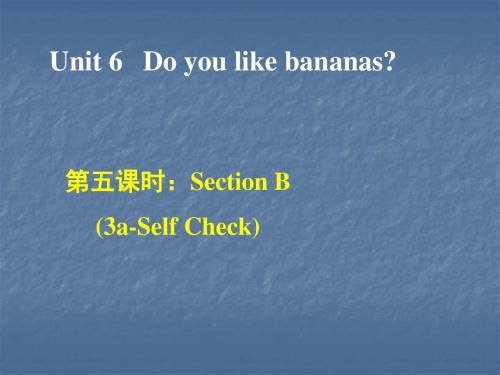
y→i+es
strawberry, dictionary, family
Self Check 2
What food, sports and colors do you like and dislike?
I like milk,eggs,basketball,ping-pong,orange and red. I don't like hamburgers,salad,ice-cream,baseball, soccer,blue and black.
morning, he runs(跑步) _______2 his sister.liHkeslikes Liu Xiang, a
great running ______3 from China. He also likes playing pingwith
-pong. He can play it very ______4. Every afternoon he plays it
table dictionary egg
apple pear
radio
vegetable family
pencil
key
volleyball
+s
+es
hamburger,carrot, photo,banana,hat, table,egg,apple, tomato pear,radio, vegetable,pencil, key,volleyball
3b
Write about what you and your partner like and don‘t like for breakfast,lunch and
dinner.
For breakfast,I like __b_r_e_a_d_,but I don't like_h_a_m__b_u_r_g_e_r_s __o_r__eg_g_s_______. For lunch,_________________________________________. And for dinnIerl,ike__r_ic_e_a_n_d__v_e_g_e_t_a_b_le_s_,__b_u_t_I__d_o_n_'t_l_i_k_e_s_a_la_d_.
初中英语七年级上册Unit 6 Do you like bananas 教案
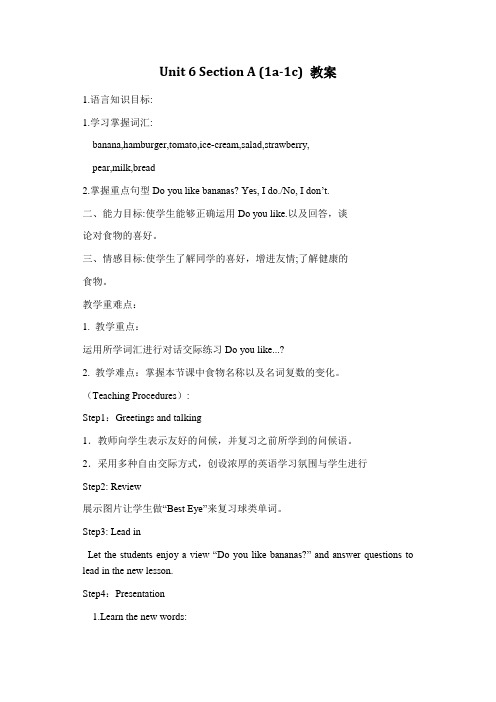
Unit 6 Section A (1a-1c) 教案1.语言知识目标:1.学习掌握词汇:banana,hamburger,tomato,ice-cream,salad,strawberry,pear,milk,bread2.掌握重点句型Do you like bananas? Yes, I do./No, I don’t.二、能力目标:使学生能够正确运用Do you like.以及回答,谈论对食物的喜好。
三、情感目标:使学生了解同学的喜好,增进友情;了解健康的食物。
教学重难点:1. 教学重点:运用所学词汇进行对话交际练习Do you like...?2. 教学难点:掌握本节课中食物名称以及名词复数的变化。
(Teaching Procedures):Step1:Greetings and talking1.教师向学生表示友好的问候,并复习之前所学到的问候语。
2.采用多种自由交际方式,创设浓厚的英语学习氛围与学生进行Step2: Review展示图片让学生做“Best Eye”来复习球类单词。
Step3: Lead inLet the students enjoy a view “Do you like bananas?” and answer questions to lead in the new lesson.Step4:Presentation1.Learn the new words:Show some pictures to learn new words of fruits and foods.2.Finish 1aLet students match the words with the things in the picture.3.Learn important sentences:展示图片进行师生互动操练重点句型:A: Do you / they like ... ?B: Yes, I/We/They do.No, I/We/They don’t.A: Does he/ she like ... ?B: Yes, he/she does.No, he/ she doesn’t.4.Pair work让学生两人一组操练重点句型:A: Do you / they like ... ?B: Yes, I/We/They do.No, I/We/They don’t.A: Does he/ she like ... ?B: Yes, he/she does.No, he/ she doesn’t.5.Finish 1bListen and number the conversations[1-3].6.Grammar:可数名词单复数变化方法讲解以及不可数名词的用法讲解7.Summary:教师带领学生回顾本节课所上的生词,句型和语法。
初一英语上册Unit6Do_you_like_bananas

5.They (likes/like) pears, but they (don't/doesn't) like strawberries.
3b Number these sentences [1-4] to make a conversation.
lunch
every
dsaoy.mAned chehdoiecskn’et n
我们朋友每天中餐都吃米饭
like chicken or fish. 和肉.他不喜欢吃鸡和鱼。
some rice
11
/s/
③
U6
a glass of milk
drinks a box of milk
three tins of coke
口3 So, let's get salad. 口2 Yes, I do. 口1 Do you like salad? 口4 OK.
3c Food Survey
Ask your classmates about the food in the chart. Find out what they like and don’t like.
4. —Let’s eat ice cream. —That ___s_o_u_n_d__s ___(听起来)good.
根据汉语提示写出正确单词。 1. We have __v_e_g_et_a_b_l_e_s_(蔬菜)for dinner
every day. 2. We have __m__a_n_y__ (许多)clubs. Join us
2018-2019学年七年级英语上册 Unit 6 Do you like bananas Se
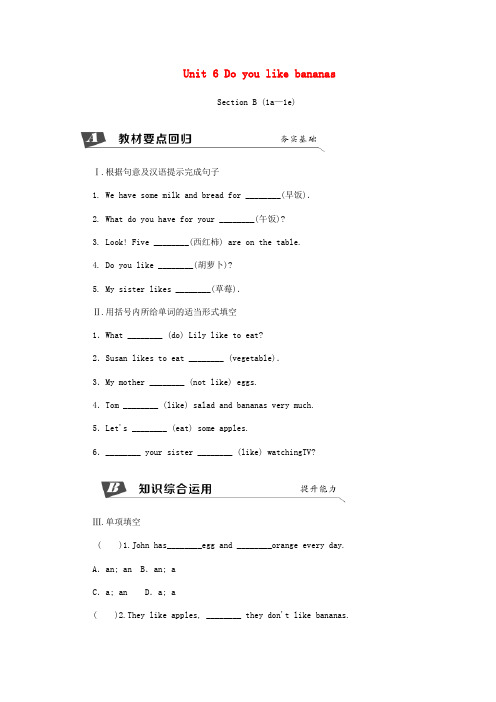
Unit 6 Do you like bananasSection B (1a—1e)Ⅰ.根据句意及汉语提示完成句子1. We have some milk and bread for ________(早饭).2. What do you have for your ________(午饭)?3. Look! Five ________(西红柿) are on the table.4. Do you like ________(胡萝卜)?5. My sister likes ________(草莓).Ⅱ.用括号内所给单词的适当形式填空1.What ________ (do) Lily like to eat?2.Susan likes to eat ________ (vegetable).3.My mother ________ (not like) eggs.4.Tom ________ (like) salad and bananas very much.5.Let's ________ (eat) some apples.6.________ your sister ________ (like) watchingTV?Ⅲ.单项填空( )1.John has________egg and ________orange every day. A.an; an B.an; aC.a; an D.a; a( )2.They like apples, ________ they don't like bananas.A.and B.butC.then D.so( )3.His friends ________ pears very much. A.likes B.likeC.doesn't like D.is like( )4.—Does your son like carrots?—________.A.Yes, he doesn't B.Yes, he isC.No, he doesn't D.No, he does( )5.________ your mother ________ carrots? A.Do; eat B.Is; eatC.Does; eat D.Are; eatⅣ.补全对话,方框中有两个多余选项A: Do you like sports, Jack?B: Yes. 1.________A: 2.________B: Yes. I'm in a soccer club.A: You look very healthy. 3.________B: I like eggs and hamburgers for breakfast. A: Do you like fruit and vegetables?B: 4.________ They are good for me.A: What vegetables do you like?B: 5.________A: I like them, too.Ⅴ.完形填空Hello, everyone! Do you know __1__ I am? Yes, you are right. I'm __2__ fridge(冰箱). I'm at Mike's home. There are many __3__ in me. Look! These are oranges and __4__. They're Mike's favorite fruits. He __5__ two bananas and an orange every day. What's this? Oh, it's __6__. Do you like to drink(喝) it? Mike __7__ it and he drinks a cup of it every morning. These are hamburgers. Mike likes __8__, but his mom doesn't __9__ him eat them. She thinks they're not good for his health. And that is a salad. It is made of (由……做成) carrots and other vegetables. Mike always has a salad after dinner.What about your __10__? What is in it?( )1.A.where B.what C.how D.who( )2.A.a B.an C.the D./( )3.A.boxes B.foods C.vegetables D.apples( )4.A.hamburgers B.balls C.keys D.bananas( )5.A.finds B.loses C.has D.knows( )k B.rice C.salad D.bread( )7.A.spells B.says C.likes D.plays( )8.A.it B.them C.me D.us( )9.A.see B.ask C.love D.let( )10.A.school B.photo C.fridge D.radio详解详析Section B (1a-1e) Ⅰ.1.breakfast 2.lunch 3.tomatoes4.carrots 5.strawberriesⅡ.1.does 2.vegetables3.doesn't like 4.likes 5.eat6.Does; likeⅢ.1.A 2.B 3.B 4.C 5.CⅣ.1.E 2.F 3.D 4.A 5.CⅤ.1.B 2.A 3.B 4.D 5.C 6.A7.C 8.B 9.D 10.C。
2019年人教版新课标英语七年级上册Unit 6 Do you like bananas
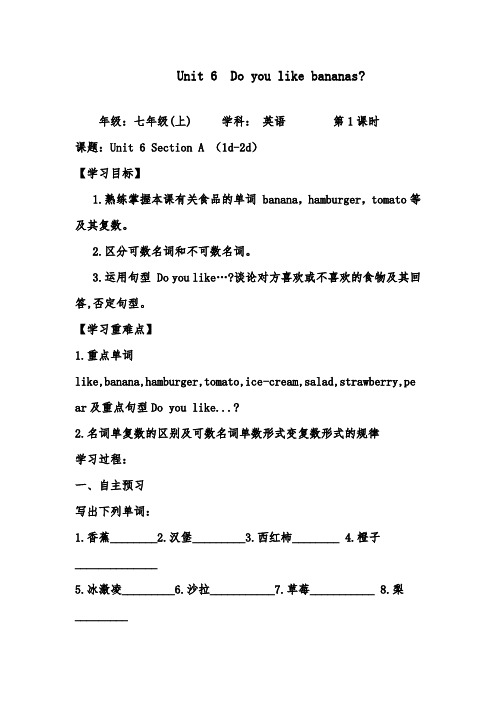
Unit 6 Do you like bananas?年级:七年级(上) 学科:英语第1课时课题:Unit 6 Section A (1d-2d)【学习目标】1.熟练掌握本课有关食品的单词 banana,hamburger,tomato等及其复数。
2.区分可数名词和不可数名词。
3.运用句型 Do you like…?谈论对方喜欢或不喜欢的食物及其回答,否定句型。
【学习重难点】1.重点单词like,banana,hamburger,tomato,ice-cream,salad,strawberry,pe ar及重点句型Do you like...?2.名词单复数的区别及可数名词单数形式变复数形式的规律学习过程:一、自主预习写出下列单词:1.香蕉________2.汉堡_________3.西红柿________4.橙子______________5.冰激凌_________6.沙拉___________7.草莓___________8.梨_________二、合作探究1. Match (1a) 将单词与图中物品配对。
2. Listening (1b)3. Dialog (1c) 练习1b对话,观看幻灯片,然后与伴编新对话。
4. Listening ( 2a, 2b )听录音,完成相应的题目。
三、当堂检测(一)写出下可数名词的复数形式。
1.star 3. watch 4. photo5.backpack6.tomato7.key8. bus 9.strawberry10.dictionary 11.wife_________12.sheep____________ 13.hero____________14.Chinese___________________(二)用所给单词的正确形式填空。
1. There are four _________ ( tomato) in the drawer.2. Jeff likes ____________( strawberry ) very much.3. Are these ____________( you) oranges.4. I______________ (not like ) math.(三)单项选择。
【K12教育学习资料】2018年秋七年级英语上册 Unit 6 Do you like banana
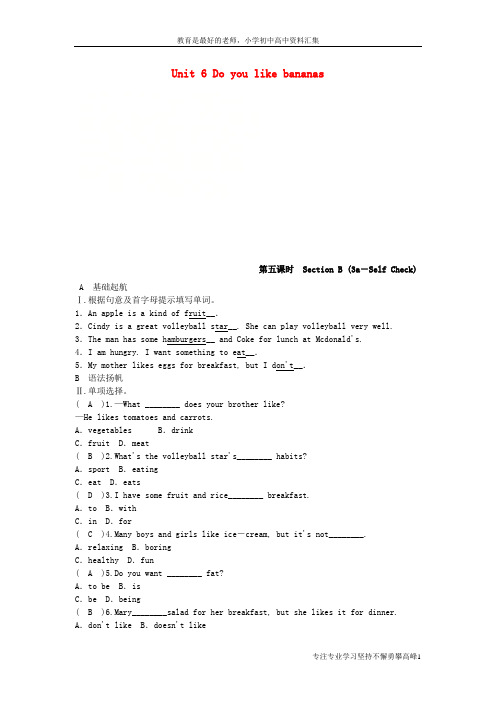
Unit 6 Do you like bananas第五课时Section B (3a-Self Check)A 基础起航Ⅰ.根据句意及首字母提示填写单词。
1.An apple is a kind of fruit__.2.Cindy is a great volleyball star__. She can play volleyball very well. 3.The man has some hamburgers__ and Coke for lunch at Mcdonald's.4.I am hungry. I want something to eat__.5.My mother likes eggs for breakfast, but I don't__.B 语法扬帆Ⅱ.单项选择。
( A )1.—What ________ does your brother like?—He likes tomatoes and carrots.A.vegetables B.drinkC.fruit D.meat( B )2.What's the volleyball star's________ habits?A.sport B.eatingC.eat D.eats( D )3.I have some fruit and rice________ breakfast.A.to B.withC.in D.for( C )4.Many boys and girls like ice-cream, but it's not________. A.relaxing B.boringC.healthy D.fun( A )5.Do you want ________ fat?A.to be B.isC.be D.being( B )6.Mary________salad for her breakfast, but she likes it for dinner. A.don't like B.doesn't likeC.like D.likes( B )7.There is some ________on the plate(盘子).A.pear B.breadC.banana D.tomato( D )8.We should eat ________food to keep us strong.A.unhealth B.unhealthyC.health D.healthy( C )9.My brother wants an apple ________.A.eat B.eatingC.to eat D.eats( A )10.What does he ________the food?A.think of B.think upC.think out D.think onⅢ.根据上下文,填出合适的单词。
Unit 6 Do you like bananas课文原文及语法重点
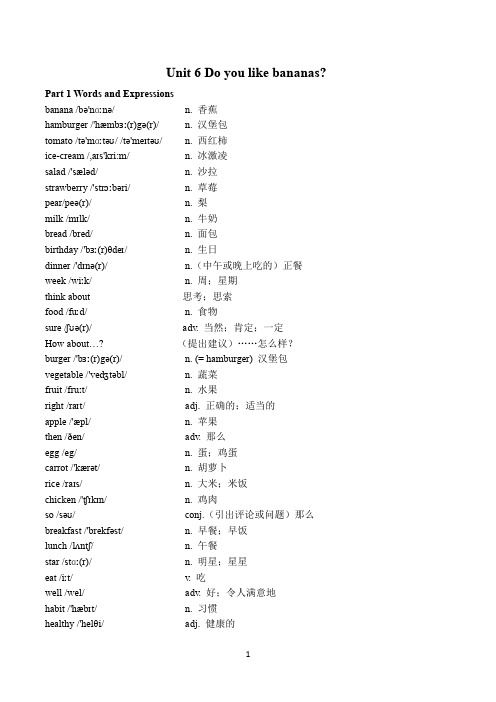
Unit 6 Do you like bananas? Part 1 Words and Expressionsbanana /bə'nɑːnə/ n. 香蕉hamburger /'hæmbɜː(r)gə(r)/ n.汉堡包tomato /tə'mɑːtəʊ/ /tə'meɪtəʊ/ n. 西红柿ice-cream /,aɪs'kri:m/ n.冰激凌salad /'sæləd/ n. 沙拉strawberry /'strɔːbəri/ n.草莓pear/peə(r)/ n. 梨milk /mɪlk/ n.牛奶bread /bred/ n. 面包birthday /'bɜː(r)θdeɪ/ n.生日dinner /'dɪnə(r)/ n.(中午或晚上吃的)正餐week /wiːk/ n.周;星期think about 思考;思索food /fuːd/ n.食物sure /ʃʊə(r)/ adv.当然;肯定;一定How about…? (提出建议)……怎么样?burger /'bɜː(r)gə(r)/ n. (= hamburger) 汉堡包vegetable /'vedʒtəbl/ n. 蔬菜fruit /fruːt/ n.水果right /raɪt/ adj.正确的;适当的apple /'æpl/ n.苹果then /ðen/ adv.那么egg /eg/ n.蛋;鸡蛋carrot /'kærət/ n.胡萝卜rice /raɪs/ n. 大米;米饭chicken /'tʃɪkɪn/ n. 鸡肉so /səʊ/ conj.(引出评论或问题)那么breakfast /'brekfəst/ n.早餐;早饭lunch /lʌntʃ/ n. 午餐star /stɑː(r)/ n.明星;星星eat /iːt/ v.吃well /wel/ adv. 好;令人满意地habit /'hæbɪt/ n.习惯healthy /'helθi/ adj. 健康的really /'riːəli/ adv. 真正地question /'kwestʃən/ n.问题want /wɒnt/ v. 需要;想要be /biː/ v.变成fat /fæt/ adj. 肥的;肥胖的Part 2:Texts课文(一)Jack: Hey, John’s birthday dinner is next week. Let’s think about the food. Tom: Sure. How about burgers, vegetable salad, and some fruit?Bill: Sounds good. John likes hamburgers.Jack: Oh, I don’t like salad.Bill:But John likes salad, and it’s his birthday.Jack:Yes, you’re right. What about the fruit?Tom: I think John likes strawberries and apples.Jack:OK. Let’s have strawberries and apples then.Structure——谈论好恶1.Do you like salad? Yes, I do./No, I don’t.2.Do they like pears? Yes, they do./ No, they don’t.3.Does she like tomatoes? Yes, she does./ No, she doesn’t.4.I like oranges. I don’t like bananas.5.We like rice. We don’t like hamburgers.6.He likes ice-cream. He doesn’t like vegetables.重点句型:Underline the correct words in the brackets.在括号内正确的单词下画线。
- 1、下载文档前请自行甄别文档内容的完整性,平台不提供额外的编辑、内容补充、找答案等附加服务。
- 2、"仅部分预览"的文档,不可在线预览部分如存在完整性等问题,可反馈申请退款(可完整预览的文档不适用该条件!)。
- 3、如文档侵犯您的权益,请联系客服反馈,我们会尽快为您处理(人工客服工作时间:9:00-18:30)。
【助记】 可数名词与不可数名词的区别
名词可数不可数,一分为二辨清楚;两半都可叫原
名,不可数名词可判定;每半已无整体性,该词可
数最公平。
类别
一般直接在 名词末尾加 -s 以 s, x, sh, 词,加-es
例词
读音规则
在清辅音后读/s/;在
desk—desks
map—maps
浊辅音和元音后读 /z/;
4.—There are many
—Yes, lots of
C
about this farm. B.photos; potatos
D.photoes; potatoes
are planted on it.
9.体育明星
8.听起来不错
10.吃得好
实用句型
1.询问某人是否喜欢某物的句型
Do you like hamburgers?你喜欢汉堡包吗?
2.表示“最喜欢”的用语
She likes tomatoes best.她最喜欢西红柿。
3.表示“非常喜欢”的用语 I like hamburgers very much.我非常喜欢汉堡包。 4.表示“有点喜欢”的用语 He likes noodles a little.他有点喜欢面条。
在t后,一起读/ts/;在
d后,一起读/dz/
box—boxes class—classes
ch结尾的名 watch—watches 读/Iz/
以f或fe 结尾的名 词,要变 f或fe为v,
knife—knives
再加-es
以“辅音字母+y”
half—halves
family—families dictionary—dictionaries
5.表示“不喜欢的”用语
I don’t like chicken.我不喜欢鸡肉。
6.询问某人早饭、午饭、晚饭喜欢吃什么的句型
What do you like for breakfast/lunch/dinner?你早饭/ 午饭/晚饭喜欢吃什么? 7.询问情况或征求意见的句型 How/What about going to the zoo?去动物园怎么样?
词的数
数或多个单数可数 不可数名词”结构
名词作主语时,谓 作主语时,谓语动
语动词用复数
词与量词的数一致
【注意】 1.可数名词也可以用于“量词+of+可数名
词”结构。如:a bag of tomatoes一袋西红柿
2.有些名词既可以作可数名词,也可以作不可数名
词。在句中为可数名词还是不可数名词,要根据句 意而定。如: oranges(可数名词,橙子)—orange(不可数名词,橙 汁) fishes(可数名词,鱼的种类)—fish(不可数名词,鱼 肉)
13.ask sb. about sth.
语法知识(一):可数名词与不可数名词 分类 可数名词 的事物的名词 名词 不可数名词
定义
表示可以计数 表示不可以计数的事物的 不可数名词没有复数形式,
特点
有单。复数形
式之分
但是可以用在“量词+of+不
可数名词”的结构中
可数名词单数作主 不可数名词作主语 语时,谓语动词用 时,谓语动词常用 谓语动 单数;可数名词复 单数;“量词+of+
【重点单词及短语复习自测】
1.food; bread; rice; egg; hamburger; chicken; salad2.vegetable; tomato; carrot; potato3.fruit; apple; pear; orange; strawberry; banana4.breakfast; lunch; dinner5.eating habits6.healthy food7.think about8.sound good9.sports star10.eat well11.after dinner12.be fat
radio—r):实义动词的一般现在时
实义动词的一般现在时有两种形式:be动词和实
义动词。我们之前学习了含系动词be的肯定句、否定
句和疑问句,也学习了实义动词have的一般现在时句 式,本单元我们又学习了实义动词like的一般现在时 态,现将实义动词的一般现在时的句式结构总结如 下:
语法专练 一、单项选择
1.(2016· 云南昆明中考,26)Each couple in China can
have two C from January 1st, 2016.
A.boy
B.girl
C.children
D.child
解析:句意:中国从2016年1月1日开始每对夫妇
可以有两个孩子。数词two后面接可数名词复数,
四个答案中只有C项是可数名词复数。故选C。
2.(2016· 贵州铜仁中考,24)—What would you like
to eat?
—Some A
A.bread
, please.
B.cake C.coffee D.tea
解析:句意:——你想要吃点什么?——请来一些
面包。咖啡和茶是饮料,排除C、D;cake是可数 名词,被some修饰时应该用复数形式,排除B。故 选A。
3.(2016· 海南中考,30)There's little
home. Go and buy some, dear.
C
left at
A.carrots
B.potatoes
C.rice
解析: 句意:家里没有大米了。去买一些吧,亲
爱的。carrots是可数名词复数;potatoes是可数名
词复数;rice是不可数名词。 little修饰不可数名词。 故选C。
读/vz/
结尾的名词,要变
y为i加-es
读/Iz/
以“元音字母+y”
结尾的名词,要直 接加-s
boy—boys
monkey—monkeys
读/z/
以“辅音字母+o”
tomato—tomatoes 读/z/
结尾的名词,多数
加-es 以“元音字母+o” 结尾的名词,加-s
potato—potatoes
UNIT 6 Do you like bananas 单元知识解读方案
重点单词及短语复习自测
1.
食物→
鸡蛋→ 沙拉
面包→
汉堡包→ 西红柿→ 苹果→ 香蕉
米饭→
鸡肉→ 胡萝卜→ 梨→ 橙子
2. 3. →
蔬菜→ 土豆 水果→ 草莓→
4.
三餐→
早饭→ 6.健康的食物
午饭→
晚饭
5.饮食习惯
7.思考;思索
